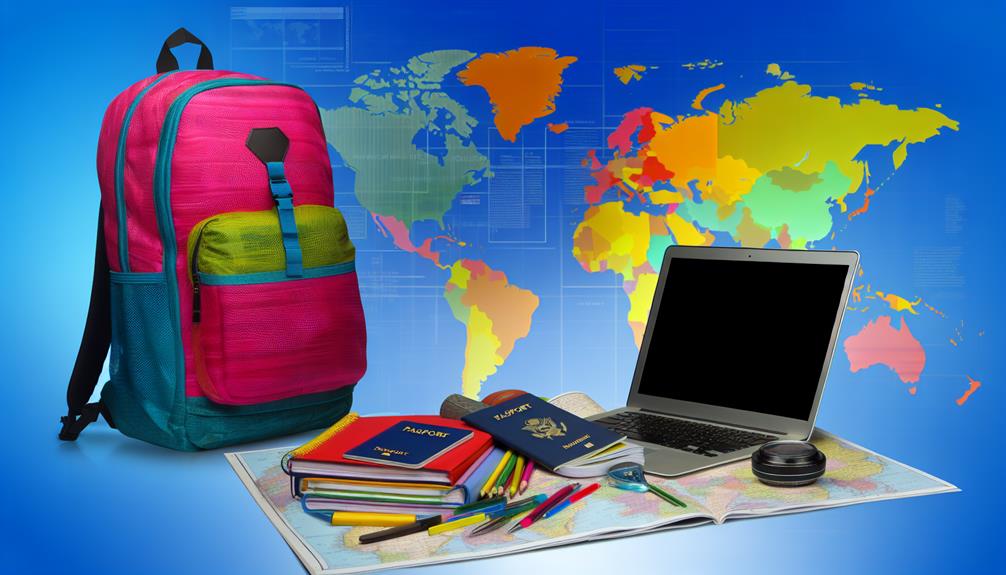Studying abroad from the USA is a fantastic way to enhance your education. Start by researching different programs like university-organized options, third-party providers, or direct enrollment at foreign universities. Create a budget and explore scholarships to help with costs. You'll need to prepare application materials and apply early to secure your spot. Once accepted, gather important documents and get ready for your adventure. Engaging in local culture will not only enrich your experience but can improve your language skills too. Want to find out more about choosing the right program and preparing for your journey?
Key Takeaways
- Research various study abroad options, including university-organized programs, third-party providers, and direct enrollment in foreign universities.
- Create a detailed budget, considering tuition, housing, and living costs, and explore scholarships to ease financial burdens.
- Prepare a compelling personal statement and gather necessary documents for the application process, ensuring you meet all requirements.
- Apply early to secure your place and the necessary visas for your chosen program, and attend pre-departure orientations for valuable insights.
- Familiarize yourself with the local culture and language, and seek opportunities for immersion to enhance your experience abroad.
Understanding Study Abroad Options
When considering studying abroad, it's essential to explore the various options available to you. A variety of study abroad programs cater to different academic needs and preferences. For instance, you can choose university-organized programs that partner with universities abroad, or go for third-party provider programs that offer unique experiences in various locations. If you're looking for a more direct approach, consider enrolling directly in foreign universities, which allows you to experience their education system firsthand.
Additionally, student exchange programs can provide you with the chance to immerse yourself in a different culture while earning credits toward your degree. If practical experience is what you seek, internships abroad and volunteer programs enhance your skills while allowing for cultural immersion. Language immersion programs are also great for boosting your language proficiency through complete cultural engagement.
Benefits of Studying Abroad
Studying abroad offers numerous benefits that can greatly enhance your academic and professional journey. By immersing yourself in a different culture, you'll gain valuable experiences that set you apart in the job market. Here are three key advantages:
- Improved Academic Performance: Students who study abroad often see a boost in their GPA. Engaging with diverse educational environments can enhance your academic performance, leading to better graduation rates—up to 18% for four-year programs.
- Enhanced Employability: With around 36 million jobs in the U.S. linked to international trade, having international experience makes you more attractive to employers. Companies value candidates who can navigate global challenges.
- Cost-Effective Education: You might find that tuition fees and living expenses in some countries are lower than at many U.S. institutions, allowing you to save money while receiving an excellent education.
Additionally, the immersive cultural experiences gained while studying abroad considerably improve your language skills, making you more competitive in global communication contexts. Embrace the opportunity to broaden your horizons as an international student!
Financial Planning for Study Abroad

Financial planning is essential for a successful study abroad experience, and understanding the costs involved can help you make informed decisions. The total cost of studying abroad can vary greatly based on location, so it's vital to research budget-friendly options. Some countries offer lower tuition and living costs, which can make a big difference in your overall expenses.
Start by estimating your total expenses, including tuition, housing, travel, and daily living costs. Creating a detailed budget will help you manage your finances effectively while abroad. Look into scholarships and grants specifically for study abroad programs; many universities and organizations provide financial support that can alleviate some of your costs.
Additionally, check if financial aid from your U.S. institution applies to your study abroad program. This can leverage existing funding for your overseas education. Don't forget to account for currency exchange rates and budget for fluctuations, as they can greatly impact your living costs in a foreign country. By planning carefully, you can create a financial strategy that guarantees your study abroad experience is both enriching and affordable.
Application Process Overview
Maneuvering the application process for studying abroad can seem intimidating, but breaking it down into manageable steps makes it easier. Here are three key steps you should follow:
- Research Programs: Look into potential study abroad programs, paying attention to their specific application requirements, deadlines, and necessary documentation like transcripts and letters of recommendation.
- Prepare Your Personal Statement: Craft a compelling personal statement that explains your motivations for studying abroad and how this experience aligns with your academic and career goals. This is your chance to stand out!
- Meet Language Proficiency Requirements: Check if you need to demonstrate language proficiency through standardized tests like the TOEFL iBT®, which many universities require.
After you've gathered all necessary materials, submit your applications early. This helps you avoid processing delays and guarantees you secure your student visa, which requires proof of university acceptance and financial support. Don't forget to attend pre-departure orientations offered by your institution; they provide valuable insights into your upcoming adventure!
Preparing for Your Adventure

After submitting your applications, the next step is to prepare for your adventure abroad. Start by researching study abroad programs that align with your academic goals. Look into options like university programs, third-party providers, or direct enrollment in foreign universities.
Next, gather the necessary documents for your application, which typically include transcripts, letters of recommendation, and proof of language proficiency such as TOEFL scores. It's vital to have these ready to avoid any last-minute stress.
Develop an all-encompassing financial plan that covers tuition costs and living expenses. Don't forget to explore potential funding sources like scholarships, grants, or financial aid to support your studies abroad. Securing a valid student visa for your destination country is significant, so make sure you have all required documentation, including proof of acceptance and evidence of financial capability.
Lastly, familiarize yourself with the cultural norms and logistical details of your host country. Understanding local laws, health and safety information, and available student support services will ease your shift upon arrival. Preparing thoroughly will help you make the most of your exciting journey!
Timing Your Study Abroad
Choosing the right timing for your study abroad experience can greatly impact both your academic journey and personal growth. To make the most of your time studying abroad, consider these factors:
- Academic Calendar: Many universities offer programs in the United States during the academic year, typically from September to June. This allows you to earn credits while immersing yourself in a new culture.
- Summer Programs: If you have a tight academic schedule, short-term summer study abroad programs can be a flexible option. These programs last a few weeks, making them ideal for brief cultural experiences without disrupting your studies.
- Junior Year Advantage: Participating in a study abroad program during your junior year of college can enhance your academic profile. This timing often aligns with significant skill development and networking opportunities that can benefit your career.
Planning ahead is vital. Set clear goals and research programs well in advance to guarantee you choose the ideal timing and duration for your studying abroad adventure. By aligning your study abroad experience with your personal and academic goals, you'll maximize the benefits of your time abroad.
Language Learning Opportunities

Language learning opportunities are a key part of the study abroad experience, enriching both your academic journey and personal growth. One of the most effective ways to enhance your language skills is through language immersion programs. These programs immerse you in a foreign culture, combining language classes with cultural activities that deepen your understanding and fluency. Many study abroad programs include language courses at host institutions, allowing you to earn academic credits while improving your proficiency.
Additionally, consider participating in language exchange programs. These initiatives connect you with native speakers, giving you the chance to practice conversational skills and gain insights into cultural nuances. This interaction is invaluable for enhancing your overall language abilities.
If you're looking for affordability and flexibility, enrolling in a language school abroad might be your best bet. These programs often offer various lengths and may even provide host family stays, which can further enrich your experience. To prepare for your immersion, utilize language learning apps before you go. They can help you build foundational vocabulary and phrases, setting you up for success when you arrive. Embrace these opportunities to make your study abroad journey unforgettable!
Types of Study Abroad Programs
Studying abroad offers various program types to match your academic and personal goals. Here are three popular options to evaluate:
- University Study Abroad Programs: Organized by your institution, these programs align with your academic requirements and handle logistics like visas and housing.
- Third-Party Provider Programs: These programs give you a broader range of options across various disciplines. They assist with applications, placements, and often include cultural immersion activities and local support.
- Direct Enrollment in Foreign Universities: If you prefer independence, this option lets you choose classes and accommodations directly. It can be cost-effective, but you'll need to manage your own application process and guarantee credit transferability.
Other options include Student Exchange Programs, like Erasmus+, which focus on cultural immersion and are popular among students, and Internships Abroad, which provide valuable practical experience. Each of these programs can lead to unique places to study and grow both academically and personally. Weigh your options carefully to find the best fit for your aspirations and lifestyle.
Resources for Study Abroad

Numerous resources are available to help you navigate the study abroad process effectively. The Bureau of Educational and Cultural Affairs (ECA) offers various study abroad programs, providing essential support for American students like you. One vital resource is the J-1 Visa, which allows you to participate in educational and cultural exchange programs in over 100 countries.
Financial resources are also key to making study abroad more accessible. Scholarships and grants specifically designed for study abroad students can greatly ease the financial burden, so be certain to explore these options.
Additionally, the U.S. Department of State provides valuable information regarding global education initiatives, promoting cooperation and understanding through exchanges. You'll find practical resources and guidance to help you prepare for your journey.
Don't underestimate the power of social media, either! Platforms like LinkedIn, Facebook, and Instagram can connect you with fellow students and provide real-time updates about study abroad opportunities. Engaging with these communities can enhance your experience and offer insights you might not find elsewhere. Leverage these resources to guarantee a successful and enriching study abroad experience!
Tips for Successful Experience
Once you've gathered the resources to support your study abroad journey, it's time to focus on making the most of your experience. Here are some tips to guarantee you have a successful time abroad:
- Create a detailed financial plan: Include tuition, living expenses, and explore potential scholarships or grants. Knowing your budget can prevent stress while you're studying.
- Engage with a host family: Living with a host family not only provides you with a supportive environment but also immerses you in the local culture. You'll get firsthand experience of daily life and customs.
- Stay connected with support networks: Maintain contact with university advisors and fellow students. They can help you navigate cultural adjustments and academic expectations, making the shift smoother.
Additionally, research your desired program thoroughly to avoid application delays. Attend pre-departure orientations to prepare for your new life, and actively participate in cultural immersion activities to deepen your understanding of the host country. By following these tips, you'll enhance your study abroad experience and create lasting memories.
Frequently Asked Questions
Can a US Citizen Study Abroad?
Yes, you can study abroad as a U.S. citizen! There are various programs available, including university-led options and direct enrollment in foreign institutions. You'll need a student visa for your host country, which usually requires an acceptance letter and proof of financial support. Many schools offer scholarships for international study, helping you with costs. Plus, studying abroad can boost your employability by showing employers your global perspective and cultural understanding.
How Can I Afford to Study Abroad Out of the Usa?
You can afford to study abroad by exploring scholarships and grants specifically for international programs. Check if your home institution offers financial aid that you can apply to your studies overseas. Consider budget-friendly countries with lower tuition and living expenses to maximize your resources. Look into work-study opportunities or internships abroad that can provide both income and valuable experience. Don't forget to utilize government programs for additional financial support!
Is It Cheaper for US Students to Study Abroad?
Yes, it can be cheaper for you to study abroad. Many countries offer lower tuition, rent, and living expenses compared to the U.S. You might find programs that provide scholarships, which can considerably reduce costs. In fact, some students report saving 30-50% overall. Plus, studying abroad could lead to a higher graduation rate, helping you finish your degree on time and potentially saving more money in the long run.
How Do I Get the Opportunity to Study Abroad?
To get the opportunity to study abroad, start by researching programs that fit your academic goals and interests. Apply for scholarships and financial aid to help with costs. Gather necessary documents like transcripts and letters of recommendation, making sure you meet deadlines. Don't forget to secure a student visa, following your host country's guidelines. Finally, connect with your university's international office for support and resources throughout the process.
